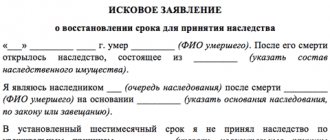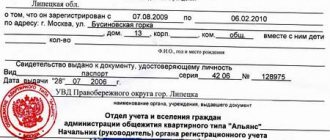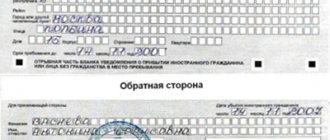Civil Code of the Russian Federation:
Article 1115 of the Civil Code of the Russian Federation. Place of opening of inheritance
The place of opening of the inheritance is the last place of residence of the testator (Article 20).
If the last place of residence of the testator who owned property on the territory of the Russian Federation is unknown or is located outside its borders, the place of opening of the inheritance in the Russian Federation is recognized as the location of such inherited property. If such inherited property is located in different places, the place of opening of the inheritance is the location of the immovable property or the most valuable part of the immovable property included in it, and in the absence of immovable property, the location of the movable property or its most valuable part. The value of property is determined based on its market value.
Return to the table of contents of the document: Civil Code of the Russian Federation part 3 in the current edition
Grounds for opening an inheritance
The opening of inheritance occurs in the event of the death of the testator. In practice, the death of an individual means:
- Biological death. Death of the owner from illness, natural causes, or injury.
- Declaring a citizen dead. Making a court decision due to a long ( more than 5 years ) absence from the last place of residence. The exact date of reference is the day the latest information is received from the owner. The exception is the situation when a citizen disappeared under circumstances that threatened his life (natural disasters, during military operations). Then the period of absence of information is 6 months .
- Establishing the fact of death. Making a court decision due to the absence of the body of the deceased, in the presence of accurate information about his death.
Example. A person is declared dead if relatives or other interested parties suspect that the owner is dead. Establishing the fact of death is possible if it is reliably known that the owner of the property died, but his body was not found. For example, in the event of falling into an abyss.
The main document for opening an inheritance is the death certificate of a citizen. The document is issued by the district registry office. The law provides for the possibility of contacting the department:
- at the place of death of the citizen;
- at the place of last registration of the deceased.
The certificate will be issued on the basis of one of the following documents:
- in case of biological death - a medical death certificate;
- when declaring a citizen dead - a court decision declaring the citizen dead;
- when establishing the fact of death - a court decision to establish the fact of death.
The usual period for accepting an inheritance
According to the provisions of Article 1154 of the Civil Code of the Russian Federation, the period for the legal claimant to accept the inheritance into his possession corresponds to 6 months from the date of death of the individual.
Article 191 of the Civil Code of the Russian Federation states that the course of a period limited to a specific period of time begins from the next date after some event. For example, if a person died on April 25, then the deadline for submitting an application to the notary’s office for applicants to receive his property starts on April 26.
If the deadline established in the Civil Code of the Russian Federation for accepting an inheritance is missed, the potential heir is considered not to have accepted the inheritance. In this case, the right to receive property may theoretically arise in other people. A special period will be established for them.
Rules for calculating final dates
The 6-month period ends, as stated in paragraph 3 of Article 192 of the Civil Code of the Russian Federation, on the last calendar day of the 6th month of the period allotted for accepting the inheritance. In the example given, this date will not be logical from a mathematical point of view - the date is October 25, but October 31.
Article 193 of the Civil Code of the Russian Federation specifies that if the period ends on Saturday, Sunday, or on the day of a religious or public holiday, which is considered a day off, the end of the period is postponed to the next working day .
If October 31 is a non-working day, then the period for acceptance of inheritance by individuals ends on November 1. Any actions on the deadline in accordance with the norms of clause 1 of Article 194 of the Civil Code of the Russian Federation can be carried out before 24 hours of this day.
What is the time, the moment of opening the inheritance
The time for opening an inheritance is determined depending on the basis for the opening:
- in the case of biological death, the day of death indicated in the medical death certificate is recognized;
- if the fact of death is established - the day specified in the court decision;
- in the case of declaring a citizen dead - the day the court decision enters into legal force.
If the participants in the process appeal the decision of the court of 1st instance in an appeal, then the procedural document gains force based on the results of the hearing of the case in the appellate court.
If a citizen declared dead went missing under circumstances that threatened his life, the court may establish the expected date of his death. Each case is considered by the court individually. The basis of the court decision is categorical evidence of the facts stated in the claim.
Example. The testator has gone missing. On the eve of his disappearance, strangers threatened him with physical harm. Contacting law enforcement agencies was unsuccessful. Six months later, the man's body was still not found. Relatives of the missing person went to court. The man was declared dead. The court decision came into force on March 15, 2017. Based on the judicial act, the relatives received a death certificate.
The procedure for opening an inheritance with a notary
The opening of an inheritance should be considered a special legal state, the occurrence of which “triggers” the procedure for registering inheritance rights. Without opening an inheritance, none of the heirs can receive the property rights due to them . Based on the provisions of Art. 1153 of the Civil Code, the opening of an inheritance involves a visit by the heir to a notary and going through a step-by-step procedure.
Important
According to Art. 1153 of the Civil Code, only the notary whose office is located at the place where the inheritance was opened can open an inheritance, i.e. in the county of the testator's last place of residence. The inheritance case in relation to one testator can be conducted exclusively by one notary, which should be taken into account if there are several heirs.
Thus, all heirs must contact one notary at the place where the inheritance was opened . In this case, they will need to go through a step-by-step procedure, each stage of which should be considered separately.
Application for opening of inheritance
The procedure for opening an inheritance begins with the potential heir filing an application for opening (acceptance) of the inheritance. The specified application is submitted to any of the notaries operating at the place of opening of the inheritance. According to Art. 62 Fundamentals of legislation on notaries, it must be submitted in writing . Such a statement must contain the following information:
- an indication of the private/public notary or official to whom the application is being submitted;
- full passport details of the heir and testator;
- grounds for accepting an inheritance - by will or by law;
- the last place of residence and date of death of the citizen, an indication of documents confirming this;
- an indication of the will of the heir to accept the inheritance;
- information about other known heirs of the same line or other obligatory heirs - if there is a will;
- information about the composition of the inheritance and documents confirming its composition, as well as its location;
- date of compilation, signature of the heir.
Opening an inheritance case
After receiving the application and the necessary documents, the notary checks them, after which, in order to record the information necessary for the transfer of property rights to the heir, he starts and opens an inheritance case . The basis for opening a case is the receipt by a notary of the first document indicating the opening of an inheritance (for example, a death certificate).
For your information
one inheritance case can be opened for one inheritance . When it is established that several cases have been opened, cases opened in violation of the principle of priority (Article 1115 of the Civil Code) are transferred to a notary whose competence includes the conduct of a specific inheritance case.
Opening and conducting a business by a notary requires him to perform a number of actions aimed at formalizing inheritance rights, among which are:
- accounting of documents, applications, refusals, consents received from heirs related to the procedure for opening an inheritance;
- notification of all interested parties about the fact of opening of inheritance;
- requesting documents necessary for registration of inheritance rights;
- promoting proper protection and management of inherited property;
- issuance of a certificate of inheritance;
- issuing decisions to cancel certificates issued by a notary and refuse to issue them.
Only original documents are placed in the inheritance file, with the exception of those that cannot be withdrawn - they are placed in the form of copies . In addition to the documents presented by the heirs and other persons, the decisions made by the notary are also included in the file.
All documents of the inheritance case are placed in a cover on which, when opening the case, a number of procedural details are indicated - data of the notary and testator, case number and index, etc.
Documents for opening an inheritance
The process of opening an inheritance is always accompanied by the collection of necessary documentation. All documents presented to the notary within the framework of the inheritance case must comply with Art. 45 Fundamentals of legislation on notaries - do not contain errors, erasures, additions, crossed out words, corrections and damage, etc. The list of documents for opening an inheritance includes:
- application for acceptance of inheritance/issuance of a certificate of right to inheritance;
- original and copy of the death certificate issued by the civil registry office;
- documentary evidence of the relationship between the heir and the testator - birth certificate, marriage certificate, divorce certificate, adoption certificate, etc.
- documentary evidence of the last place of residence - a certificate of registration, an extract from the house register, etc.,
- original and copy of the potential heir’s passport;
- the original and a copy of the will, with a note from the notary who certified it that it was not canceled or changed;
- documents confirming the location of the testator's property;
- title documents for property included in the inheritance mass, etc.
Information
Please note that this list is purely approximate and may differ depending on the characteristics of a particular inheritance case.
Cost of opening an inheritance
The very fact of opening an inheritance, as such, does not involve any costs, since, based on Art. 1113 of the Civil Code, it occurs automatically with the death of the testator, declaring him dead or determining the date of his expected death. However, the heir will incur certain expenses when accepting the inheritance , which is an integral result of the inheritance procedure. So, the cost of this procedure will include several factors:
- The cost of the state fee for issuing a certificate of inheritance . According to paragraph 22 of Art. 333.24 Tax Code, its size depends on the presence of family ties. So, if the heirs are close relatives (Article 14 of the Family Code) of the testator, then the amount of the state duty will be 0.3% of the market value of the inherited property (but not more than 100,000 rubles). For all other heirs, the size of half the share will be equal to 0.6% of the value of the property (but not more than 1 million rubles).
- Please note that the provisions of Art. 333.38 of the Tax Code, the legislator has established a number of benefits for certain categories of heirs when paying the specified state duty.
- Cost of legal and technical notary services . In addition to the state fee, the notary charges a fee for other operations performed by him - drawing up an application for acceptance of an inheritance, copying documents, issuing duplicates, opening a case, etc. The cost of these services is regulated by each notary separately.
- The cost of assessing inherited property . The assessment of the market value of property is carried out for the purpose of collecting a state fee for issuing a certificate of inheritance and, as a rule, is a mandatory requirement of notaries. It is carried out by private appraisers, and therefore the cost of the appraisal is set individually by each of them. Please note that when assessing real estate, the legislator allows the use of not only market, but also cadastral and inventory values.
What is considered the place of opening of inheritance?
Options for where to open an inheritance
| No. | Option | A comment |
| 1 | Place of last permanent registration of the deceased owner | Determined by a certificate from the housing department or passport office. The most popular option. |
| 2 | Location of property | If there is no data on the last place of registration or if the citizen recently lived outside the country |
| 3 | Location of real estate owned by the deceased | If a citizen had many properties located in different places |
| 4 | Location of the most valuable property | If the estate does not include real estate. An appraisal must be carried out to determine the value. |
| 5 | By a court decision to establish the place of opening of the inheritance | If there is no information about the location of the inherited property |
The place of opening of the inheritance is usually determined by the residential address of the deceased subject (Article 1115 of the Civil Code of the Russian Federation). The remaining options are used quite rarely.
Comments on Article 1115 of the Civil Code of the Russian Federation, judicial practice of application
Explanations of the Supreme Court of the Russian Federation
Some clarifications of the provisions of Article 1115 of the Civil Code of the Russian Federation on the place of opening of the inheritance are contained in paragraphs. 17, 18 Resolution of the Plenum of the Supreme Court of the Russian Federation dated May 29, 2012 N 9 “On judicial practice in inheritance cases.” In particular, the following is stated.
Place of opening of inheritance
The place of opening of the inheritance should be considered the last place of residence of the testator on the day of opening of the inheritance (clause 1 of Article 20, part one of Article 1115 of the Civil Code of the Russian Federation).
The place of residence of the testator is confirmed by his registration at the place of residence or place of stay
The place of residence of the testator may be confirmed by documents certifying his corresponding registration with the registration authorities of citizens of the Russian Federation at the place of stay and place of residence within the Russian Federation (clause 1 of Article 20 and part one of Article 1115 of the Civil Code of the Russian Federation, parts 2 and 4 of Article 1 of the Housing Code of the Russian Federation, hereinafter - the Housing Code of the Russian Federation, parts two and three of Article 2 and parts two and four of Article 3 of the Law of the Russian Federation of June 25, 1993 N 5242-1 “On the right of citizens of the Russian Federation to freedom of movement, choice of place of stay and residence within Russian Federation").
Establishment by the court of the fact of the place of opening of the inheritance
In exceptional cases, the fact of the place of opening of the inheritance may be established by the court (clause 9 of part 1 of Article 264 of the Code of Civil Procedure of the Russian Federation). When considering such an application, the court takes into account the length of residence of the testator in a specific place at the time of opening of the inheritance, the location of the inherited property in this place and other circumstances indicating the primary residence of the testator in this place.
When is the location of the testator’s property recognized as the place of opening of the inheritance?
If the last place of residence of the testator who owned property on the territory of the Russian Federation is unknown or known, but is located outside its borders, the place of opening of the inheritance in the Russian Federation in accordance with the rules of part two of Article 1115 of the Civil Code of the Russian Federation is recognized as the location on the territory of the Russian Federation: real estate included in the hereditary property located in different places, or its most valuable part, and in the absence of real estate - movable property or its most valuable part. The value of property when establishing the place of opening of the inheritance is determined based on its market value at the time of opening of the inheritance, which can be confirmed by any evidence provided for in Article 55 of the Code of Civil Procedure of the Russian Federation.
Chapter 2 “Indisputably determining the place of opening of inheritance” of the “Methodological recommendations for registration of inheritance rights” approved by the decision of the Federal Notary Chamber of March 25, 2019, Protocol No. 03/19 contains the following explanations:
Place of opening of inheritance
The place of opening of the inheritance is determined by the notary at the last place of residence of the testator (Clause 1 of Article 1115 of the Civil Code of the Russian Federation).
Last place of residence - the residential premises in which the citizen was registered
Indisputably, the notary determines the last place of residence of the citizen is a residential building, apartment, room, residential premises of a specialized housing stock or other residential premises in which the citizen was registered at the place of residence in accordance with paragraph 1 of Art. 20 Civil Code of the Russian Federation, Art. 2 of the Law of the Russian Federation of June 25, 1993 N 5242-1 “On the right of citizens of the Russian Federation to freedom of movement, choice of place of stay and residence within the Russian Federation” and paragraph 47 of the Regulations. It should be borne in mind that clause 47 of the Regulations has an open list of documents confirming the place of residence of the testator. The document provided for by the specified paragraph of the Regulations, confirming registration at the place of residence, is not issued by the registration authorities of citizens due to the loss of force of the Administrative Regulations for the provision by the Federal Migration Service of the state service for registration of citizens of the Russian Federation at the place of stay and at the place of residence within the Russian Federation, approved by order of the Federal Migration Service of Russia dated September 11, 2012 N 288. Taking into account the above, notaries have the right to use information about the last place of residence of the testator according to other documents to confirm the place of opening of the inheritance.
What determines the registration procedure for certain categories of citizens?
The procedure and place of registration of certain categories of citizens at the place of residence are determined by Chapter IV of the Rules for registration and deregistration of citizens of the Russian Federation at the place of stay and at the place of residence within the Russian Federation and the list of persons responsible for receiving and transferring documents for registration to the registration authorities and deregistration of citizens of the Russian Federation at the place of stay and place of residence within the Russian Federation, approved by Decree of the Government of the Russian Federation of July 17, 1995 N 713.
In accordance with these Rules, for the purpose of determining the place of opening of the inheritance, the place of residence of the testator is determined:
for military personnel - place of registration at the place of residence, if any, or at the place of deployment of the military unit;
for citizens registered in religious buildings - the location of the religious buildings;
for citizens belonging to the indigenous small people of the Russian Federation, leading a nomadic and (or) semi-nomadic lifestyle and not having a place where they permanently or primarily live - the address of the local administration of the corresponding settlement;
for convicted citizens serving sentences in places of deprivation of liberty - their place of registration at their place of residence.
In which case is the place of opening of the inheritance determined by the notary, and in which by the court?
By establishing the place of opening of the inheritance in the event of registration of the testator at the time of death in a residential premises at the place of residence, while maintaining registration at the place of residence at another address, the notary indisputably determines the place of opening of the inheritance to be the place of registration at the place of residence.
The fact of the place of opening of the inheritance at the place where the testator was registered at the place of residence (or the fact of the permanent or primary residence of the testator, where he was registered at the place of residence) must be established by the court.
Determining the place of opening of the inheritance when the place of residence of the testator is unknown or when the inheritance is located outside the Russian Federation
When establishing the place of opening of the inheritance in the case where the place of residence of the testator who owned property on the territory of the Russian Federation is unknown, the notary is guided by clause 2 of Art. 1115 of the Civil Code of the Russian Federation.
If the inherited property is located outside the territory of the Russian Federation or the deceased citizen lived on the territory of a foreign state on the date of opening of the inheritance, the place of opening of the inheritance is determined by a notary in accordance with international treaties concluded by the Russian Federation, and in their absence - the provisions of paragraph 1 of Art. 1224 of the Civil Code of the Russian Federation.
If the place of opening of the inheritance cannot be determined by a notary in an indisputable manner, the place of opening of the inheritance is established by the court (Clause 9, Part 2, Article 264 of the Civil Procedure Code of the Russian Federation, hereinafter referred to as the Code of Civil Procedure of the Russian Federation).
Previously, explanations on these and other issues were contained in section I. Opening an inheritance case. Proceedings in the inheritance case of the no longer valid “Methodological recommendations for registration of inheritance rights” (approved by the Decision of the Board of the FNP from 02/27–28/2007, Minutes No. 02/07). In particular, the “recommendations” contained explanations on the questions: “What is the last place of residence of the testator?”; “The inheritance is opened at the place of residence or at the place of stay of the testator?”; “Initiation of several inheritance cases”; “The last place of residence of the testator is a foreign country.”
How does the inheritance open?
Based on one of the supporting documents, a death certificate is issued. The date indicated in the document is considered the date of opening of the inheritance.
To obtain the necessary document, the heirs need to provide the following papers to the registry office:
- application (form No. 21);
- a copy of the applicant's passport;
- ID card of the deceased (if available);
- document - basis (medical death certificate, court decision).
The first time a death certificate is issued free of charge. A state fee is charged for issuing a duplicate document. Its size is 350 rubles .
If the original is lost, the certificate must be restored.





